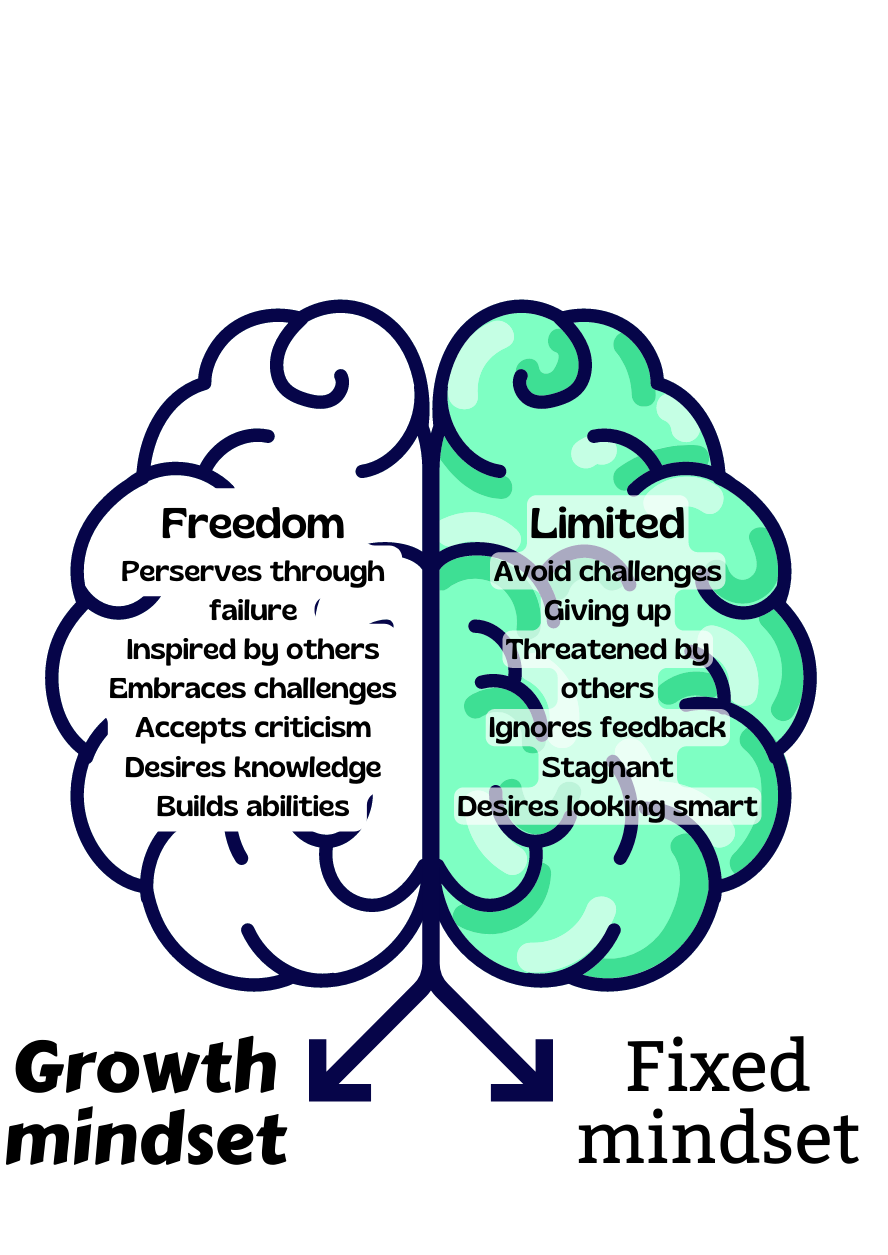Have you ever found yourself giving up on a goal because it seemed too complicated? Or have you avoided taking on a challenge because you were afraid of failure?
A fixed mindset is the belief that personal abilities and intelligence are set at birth and cannot be changed. This way of thinking can hold us back and prevent us from reaching our full potential. On the other hand, a growth mindset is a belief that these qualities can be developed and improved over time through effort and learning.

We will explore the concept of a growth mindset versus a fixed mindset and how it can impact our success and well-being. We will also discuss cultivating a growth mindset and unlocking a child’s full potential.
As a teacher, I have seen first-hand the difference between these two mindsets in my students. For example, I once had a student who struggled with math. Whenever she encountered a complex
problem, she would immediately give up and tell me that she was just “not good at math.” This attitude of defeatism is a clear indication of a fixed mindset. On the other hand, I had another student that also struggled with math, but instead of giving up, he would ask for help and put in extra effort to understand the concepts. He would even tackle extra problems on his own to improve his skills. This attitude of perseverance and determination is a clear sign of a growth mindset.
The difference between these two mindsets is clear: a growth mindset allows for a love of learning and a willingness to take on challenges, while a fixed mindset leads to a fear of failure and a reluctance to try new things.
Why do students have a fixed mindset if a growth mindset is so beneficial?
Some students may have been taught to believe that intelligence and abilities are fixed and cannot be changed, leading to a negative attitude towards learning and challenges. Others may have experienced setbacks or failures in the past and have become discouraged or afraid to try new things. Still, others may have yet to be exposed to the idea of a growth mindset and may not realise that intelligence and abilities can be developed through effort and learning.
Ultimately, the specific reasons for a student’s fixed mindset will depend on their experiences and background.
So how can we promote a growth mindset in students?
Here are a few strategies that can be effective:
- Encourage effort and hard work: One of the most important ways to promote a growth mindset is to emphasise the importance of effort and hard work. By focusing on the process of learning and improvement rather than just the end result, you can help students and children see that their abilities and intelligence can be developed over time.
- Provide support and encouragement: Another way to promote a growth mindset is to provide students and children with support and encouragement. This can include praising their efforts and progress, offering constructive feedback, and providing opportunities for them to learn and grow.
- Model a growth mindset yourself: As a teacher or parent, you can also promote a growth mindset by modelling it yourself. By demonstrating that you are open to learning and improvement and showing students and children that you value effort and hard work, you can help them develop a growth mindset.
- Provide opportunities for challenge and learning: One way to promote a growth mindset is to provide students and children with opportunities to challenge themselves and learn new things. This can include offering them complex problems to solve, providing them with new and exciting material to learn, and encouraging them to take on new and challenging projects.
- Help students and children develop a positive attitude: Another way to promote a growth mindset is to help students and children develop a positive attitude. This can include teaching them how to set goals and encouraging them to see challenges as opportunities to learn and grow.
- Encourage students and children to seek feedback and support: A growth mindset is often fostered through feedback and support. Encouraging students and children to seek feedback from their peers, teachers, and others and providing them with support when they need it. You can help them develop a growth mindset.
- Teach students and children about the brain and learning: Teaching students and children about the brain and learning can also promote a growth mindset. By helping them understand that the brain is like a muscle that can be strengthened and developed over time, you can help they see that their abilities and intelligence are not fixed but can be improved through effort and hard work.
How does a growth mindset link to independent learning?
Although it is possible to be an independent learner with a fixed mindset, it is more challenging. People with a fixed mindset tend to have a more rigid and inflexible approach to learning. They may be more resistant to new ideas, more likely to give up in the face of challenges, and less open to feedback and support. This can make it difficult for them to take control of their own learning and development and to adapt and improve in response to new information and experiences.
On the other hand, people with a growth mindset are more likely to be successful independent learners. They approach learning with curiosity, openness, and determination, and they are more likely to take on new challenges, seek feedback and support, and persevere even when they encounter difficulties. This attitude can help them become independent learners who can take control of their learning and development and adapt and improve over time. This can foster a love of learning and a desire to continue learning throughout life, even beyond the school years. For example, imagine a student who struggles with English. A student with a fixed mindset might believe they are not “good at” English and therefore give up easily when faced with writing an essay.
On the other hand, a student with a growth mindset might believe that they can improve their English skills through effort and learning and therefore be more likely to seek out additional help and resources, such as a tutor or online lessons, to improve their skills. This can ultimately lead to more success, enjoyment in English and a lifelong love of learning. In conclusion, a growth mindset is the best for life beyond school because it promotes independent learning and a love of learning.
The result
By believing that abilities and intelligence can be improved through effort and learning, individuals are more likely to take on challenges, persist in facing obstacles, and seek opportunities to learn and grow. This can lead to greater success and enjoyment in personal and professional endeavours.

Want to read more about a growth mindset?
Take a look at the following articles to learn more:
https://hbr.org/2016/01/what-having-a-growth-mindset-actually-means
https://hbr.org/2014/11/how-companies-can-profit-from-a-growth-mindset

